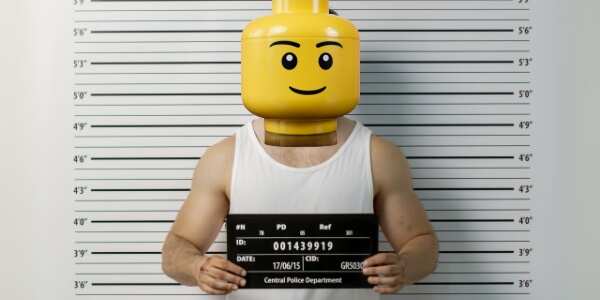
The Golden State is home to sun, surf, and progressive politics. It’s like a cautionary tale that even its residents are sprinting away from faster than a cheetah on Red Bull. One doesn’t have to look very far to see part of the problem of why people are leaving the state in droves.
In a state grappling with issues like smash-and-grab robberies and burglary tourism, some question the legislative priorities. This is especially relevant in regard to a law that changes the way police deal with mug shots. In an effort to comply with a new law, a police department in Southern California city is using Lego heads on mug shots.
Why? Because the new law concerns the practice of sharing booking photos on social media. The law has been a topic of controversy in California since it went into effect at the beginning of the year. While some believe that sharing booking photos is a useful tool for identifying and capturing criminals, others argue that it violates the privacy rights of arrested individuals. Critics of the law suggest that the focus on privacy may overlook the concerns of crime victims and the broader challenges facing California.
The debate has been particularly heated because the legal system in California is seen by some as being more sympathetic to the rights of criminals than to those of shop owners and other victims of crime.
In September 2023, Governor Newsom approved Assembly Bill 994 (AB994), which became effective on January 1, 2024. This legislation directly addresses the protocols for sharing and posting booking photos on social media platforms operated by law enforcement agencies.
Assembly Bill 994 and Penal Code 13665 restrict the sharing of suspect photos for nonviolent crimes. A police department or sheriff’s office cannot share booking photos of an individual arrested for a nonviolent crime on social media unless specific circumstances apply.
It also mentions using the name and pronouns given by the arrested individual and removing the booking photo from its social media page within 14 days. The booking photo is a photograph taken while an individual is undergoing the intake or booking process in a custodial facility. It is often referred to as a “mug shot.”
Law enforcement agencies typically post photos of arrestees on their social media accounts. The aim is to catch the attention of individuals who may have been victimized by the arrestee. Furthermore, these photos may also be shared as a precautionary measure to safeguard the community from future crimes that the arrestee may potentially commit.
One city in California has found a unique way of dealing with the new law. Welcome to Murrieta, California, a city in Southern California with a population of over 100,000. According to Neighborhood Scout, a website that provides local statistics to potential homebuyers or renters, the crime rate in Murrieta is considerably higher than the national average compared to all communities in America. It’s important to note that while crime can happen anywhere, Murrieta residents have a 1 in 65 chance of becoming a victim of crime.
Law enforcement officials in Murrieta, adhering to a new privacy law, now obscure mug shots with Lego figureheads before sharing them on social media. According to the Police Department, “In order to share what is happening in Murrieta, we chose to cover the faces of suspects to protect their identity while still aligning with the new law.”
While some question Lego figureheads’ effectiveness, city officials emphasize their commitment to transparency and respect for individuals’ rights.
Comments have already started rolling in on the sheriff’s Facebook account. Most comments are trolling the new law like, “Leave it to California to make it easier for the criminals.” Another comment added, “The reality is that this new law protects suspects from being identified by the public for other crimes they may have witnessed committing.”














